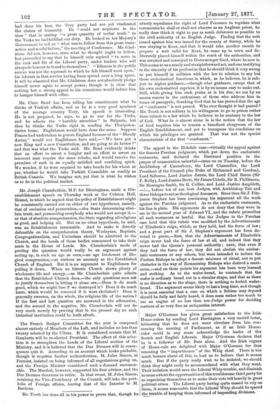Mr. Joseph Chamberlain, M.P. for Birmingham, made a Dis- establishment
speech on Thursday week at the Colston Hall, Bristol, in which he argued that the policy of Establishment might be consistently carried out on either of two hypotheses, namely, that of exclusion and persecution,—the State determining abso- lute truth, and persecuting everybody who would not accept it,— or that of absolute comprehension, the State regarding all religions as good, and helping all. But on no other hypothesis, he said, was an Establishment reasonable. And to make it directly defensible on the comprehension theory, Wesleyans, Baptists, Congregationalists, and Unitarians should be admitted to the Church, and the heads of these bodies summoned to take their seats in the House of Lords. Mr. Chamberlain's mode of putting the question would really be an argument against setting up, in such an age as ours,—an age intolerant of illo- gical compromises,—so curious an anomaly as the Established Church of England. But it is no argument to Englishmen for pulling it down. When an historic Church shows plenty of wholesome life and energy, —as Mr. Chamberlain quite admits that the Established Church does,—the only questions men ask to justify themselves in letting it alone are,—Does it do much good, which we might lose if we destroyed it? Does it do much harm, which would be removed if it were abolished ? Does it generally sweeten, on the whole, the religious life of the nation? If the first and last question are answered in the affirmative, and the second in the negative, Mr. Chamberlain will not do very much merely by proving that in the present day no such historical institution could be built afresh.


































 Previous page
Previous page